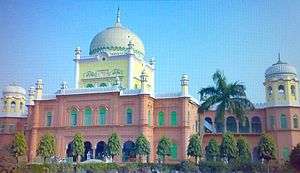Sipah-e-Sahaba Pakistan
| Part of a series on |
| The Deobandi movement |
|---|
 Darul Uloom Deoband, India |
| Ideology and influences |
| Founders and key figures |
| Notable institutions |
| Centres (Markaz) of Tabligh |
| Associated Organizations |
| Militant Organisations |
Sipah-e-Sahaba Pakistan (SSP — Guardians of the Prophet's Companions), now renamed Ahle Sunnat Wal Jamaat, is an extremist Deobandi Muslim organisation in Pakistan, which also functioned as a political party. It broke away from the main Deobandi Sunni organisation Jamiatul Ulema-e-Islam in 1985. Established in Jhang by Haq Nawaz Jhangvi, it aims to counter the Shiite Muslim influence in Pakistan, which is supposed to have increased in the wake of the Iranian Revolution.[1][2][3]
The organisation was banned by President Pervez Musharraf in 2002 as a terrorist organisation under the Anti-Terrorism Act of 1997.[2][3] In March 2012, the government of Pakistan banned Sipah-e-Sahaba again. The Supreme Court of Pakistan removed this ban in November 2014.[4][5] The government of the United Kingdom banned the group earlier in 2001.[6]
History
Haq Nawaz Jhangvi, Zia-ur-Rehman Farooqi, Eesar-ul-Haq Qasmi and Azam Tariq, formed the Sipah-e-Sahaba in 1985 originally under the name of Anjuman Sipah-e-Sahaba.[7][8]
A leader of Sipah-e-Sahaba was a minister in the Coalition Government in Punjab in 1993 and the group has held seats in the Pakistan National Assembly.[3][7]
When Jhangvi was assassinated in 1990 by presumed Shi'a militants, Zia-ur Rehman Farooqi assumed leadership of the group. Zia-ur-Rehman Farooqi died in a bomb explosion on January 19, 1997 at the Lahore Session Court.[7] After his death, Azam Tariq led the group until October 2003, when he was also killed in an attack widely attributed to the militant Shi'a organization Sipah-e-Muhammad, along with four others.[3][7]
Bhakkar clashes
| “ | "Bhakkar: Provocative announcements from the mosques (governed by the defunct Sipah-e-Sahaba)", Police is helpless and failed." ― Geo News Headline, 20:06 PST, August 2 | ” |
and the workers of the Sipah-e-Sahaba took place at Bhakkar which is situated in the west of the Punjab, Pakistan. At least 4 Shiite Muslims and 7 SSP have been killed and a dozen have been injured after the workers of the Sipah-e-Sahaba clashed with the local Shiite Muslims on August 23, 2013.
The clashes between the banned Sipah-e-Sahaba and Shiite Muslims happened in the town of Kotla Jam and Darya Khan.
The conflict followed a protest rally held by the banned Sipah-e-Sahaba, where the militants of the banned outfit were chanting slogans against Shiite Muslims.
They were identified as Safdar Shah and Imran Shirazi of Darya Khan and Ali Raza, Khan Muhammad and Kamran Mohana of Kotla Jam townships.
The affected area’s residents rejected the media reports that it was a clash between two religious groups. They warned the media persons to desist from equating peaceful residents with the sectarian and fanatic terrorists. They said it was an armed and provocative attack on peaceful population. They said that self-defense was their legal right that they opted for.
The victims’ families and friends have gathered at Hussaini Chowk roundabout of Bhakkar district to protest against the attack on their houses and unarmed people.
After the situation, the Majlis Wahdat-e-Muslimeen, Shia Ulema Council, Imamia Students Organization condemned the clashes and have declared three days of mourning. Also, the then Chief Minister of the Punjab Shahbaz Sharif took notice of the situation, saying those who had broken the law will be dealt severely following the arrests of the terrorists belonging to the defunct organisation.
Affiliations
- In 1996 elements within the Sipah-e-Sahaba who did not believe the organisation violent enough left to form the Lashkar-e-Jhangvi.[7]
- In October 2000, Masood Azhar, founder of the banned Jaish-e-Mohammed, was quoted as saying that "Sipah-e-Sahaba stands shoulder to shoulder with Jaish-e-Muhammad in Jihad."[7] A leaked U.S. diplomatic cable described it as another Sipah-e-Sahaba breakaway Deobandi organisation."[9]
- A diplomatic cable, originally dated October 23, 2009 and later leaked to the media, from the U.S. embassy in Islamabad indicated that Qari Hussain, a leading militant of the Tehrik-i-Taliban Pakistan, had roots in the defunct Sipah-e-Sahaba and that many of the Taliban’s foot soldiers are from Sipah-e-Sahaba ranks.[9]
- According to Animesh Roul, Ahle-Sunnat-Wal-Jamat is a front group for SSP, and is also banned in Pakistan.[10]
See also
References
- ↑ Tan, Andrew T .H. (2010), Politics of Terrorism: A Survey, Routledge, p. 214, ISBN 978-1-136-83336-6
- 1 2 B. Raman, "Musharraf's Ban: An Analysis", South Asia Analysis Group , Paper no. 395, 18 January 2002
- 1 2 3 4 "Pakistan: The Sipah-e-Sahaba (SSP), including its activities and status", Immigration and Refugee Board of Canada, 26 July 2005
- ↑ Hasan, Syed Shoaib (2012-03-09). "Pakistan bans Ahle Sunnah Wal Jamaat Islamist group". BBC News. Retrieved March 10, 2012.
- ↑ "Sipah-e-Sahaba Pakistan". SATP. Retrieved 14 May 2014.
- ↑ "Police probe Scottish mosque figures' links to banned sectarian group". BBC News Online. 31 March 2016.
- 1 2 3 4 5 6 "Sipah-e-Sahaba Pakistan".
- ↑ Sohail Mahmood (1995). Islamic fundamentalism in Pakistan, Egypt and Iran. Vanguard. p. 434. Retrieved 11 September 2012.
- 1 2 "2009: Southern Punjab extremism battle between haves and have-nots". Dawn.com. Dawn Media Group. 2011-05-22. Retrieved 2011-05-25.
- ↑ Roul, Animesh (June 26, 2015). "Growing Islamic State Influence in Pakistan Fuels Sectarian Violence". Terrorism Monitor. 13 (13). Retrieved 30 June 2015.